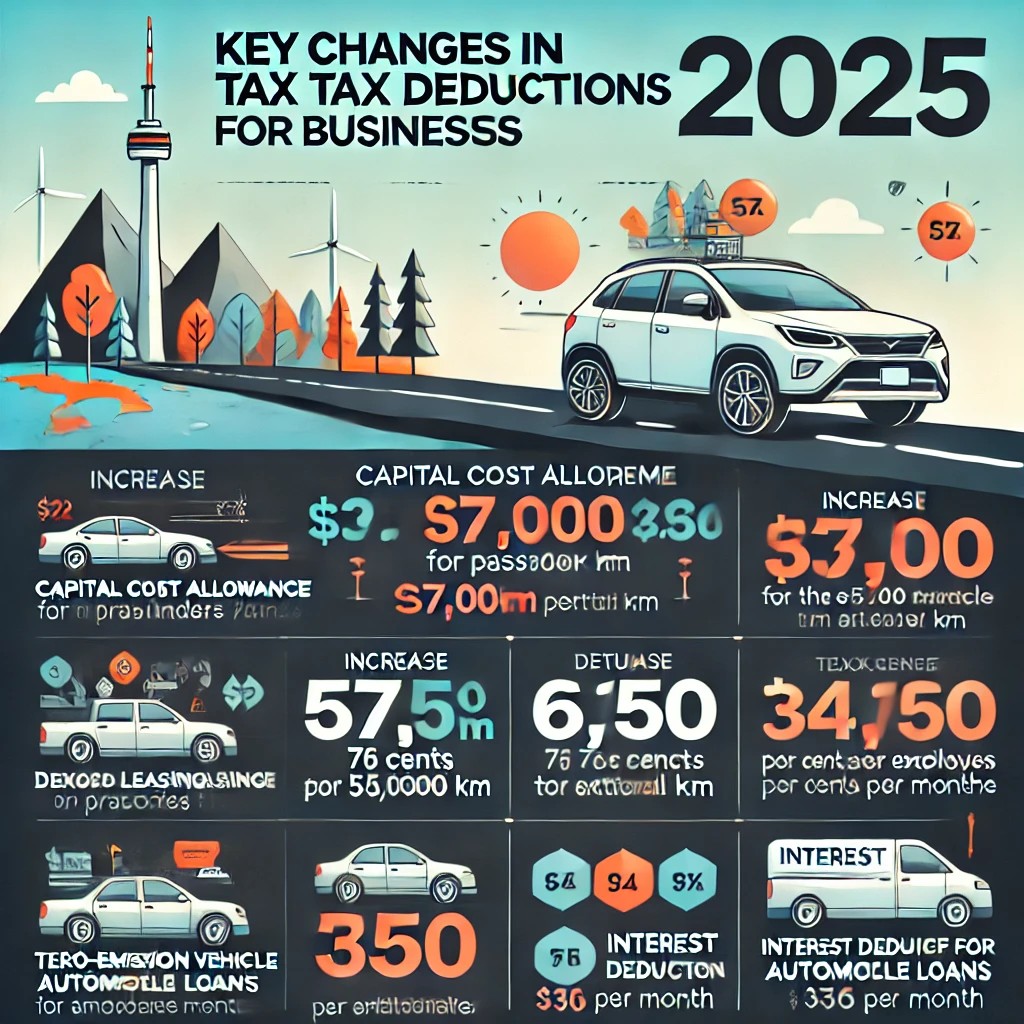
As we enter the new year, businesses in Canada can look forward to updates that could impact the way they handle automobile-related expenses and deductions for 2025. The Department of Finance Canada recently announced changes to the automobile income tax deduction limits and expense benefit rates, effective January 1, 2025. These updates could help businesses reduce costs and encourage the use of eco-friendly vehicles. Let’s break down the key changes and how they may affect your business.
Key Updates for 2025
- Increased Capital Cost Allowance (CCA) Limit for Class 10.1 Passenger Vehicles
For businesses purchasing new or used passenger vehicles, the ceiling for the CCA under Class 10.1 will rise from $37,000 to $38,000, before tax. This increase will help businesses claim higher depreciation expenses for eligible vehicles. - Higher Deductible Leasing Costs
If your business leases vehicles, you’ll benefit from an increased deductible leasing cost of $1,100 per month (up from $1,050). This applies to new leases entered into on or after January 1, 2025, before tax. - Tax-Exempt Allowance for Personal Vehicle Use
Employees who use their personal vehicles for business purposes will also see a rise in the tax-exempt allowance:- Provinces: 72 cents per kilometre for the first 5,000 km driven, and 66 cents for additional kilometers.
- Territories: 76 cents for the first 5,000 km, and 70 cents for additional kilometres. These increases are designed to account for rising vehicle costs and ensure that employees are fairly reimbursed for business-related driving.
- Taxable Benefit Rates for Employees
The rate used to calculate the taxable benefit for employees who use their personal vehicle for business purposes will increase to 34 cents per kilometre for 2025. For employees who work in the automobile sales and leasing industry, the rate will be 31 cents per kilometre. - Zero-Emission Vehicles CCA Limit Remains the Same
The ceiling for CCA on zero-emission passenger vehicles remains unchanged at $61,000, before tax. This limit continues to be appropriate for encouraging businesses to adopt environmentally friendly vehicles like fully electric, hydrogen-powered, or plug-in hybrid vehicles. - No Change to Interest Deduction for Automobile Loans
The maximum allowable interest deduction for automobile loans will stay at $350 per month, which is deemed to be appropriate for 2025.
Why This Matters for Businesses
These updates could offer substantial savings for businesses that use vehicles in their operations, whether for sales teams, deliveries, or employee commuting. The increases in tax-exempt allowances and taxable benefit rates ensure that both businesses and employees can take advantage of fair reimbursement policies for automobile expenses.
Moreover, the government continues to encourage businesses to adopt zero-emission vehicles by maintaining the CCA limit for these vehicles at $61,000, which could be particularly beneficial for businesses looking to lower their carbon footprint.
Conclusion
The new automobile deduction limits and expense benefit rates for 2025 are designed to help businesses navigate the rising costs of vehicle ownership while promoting environmentally friendly practices. By staying informed about these changes, businesses can ensure they maximize available deductions and allowances, leading to better cost management in the coming year.
